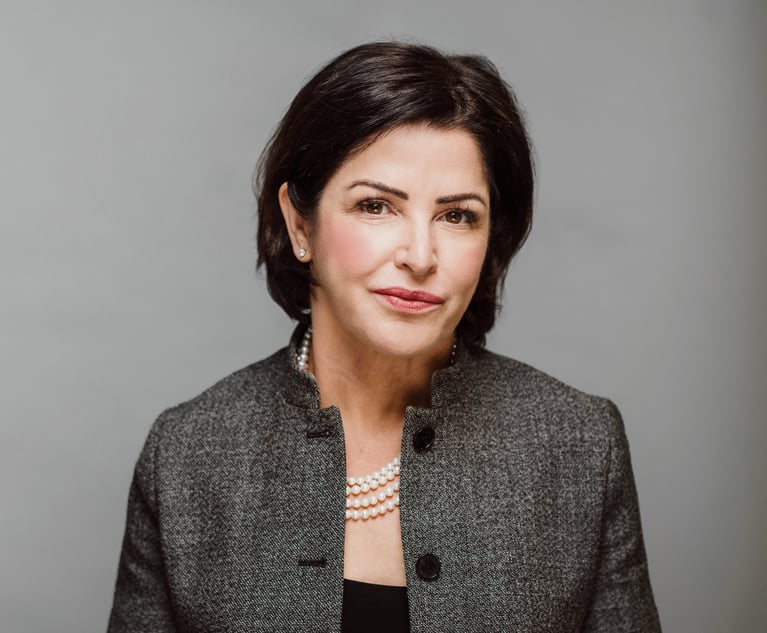The Need for Soft Skills While Working Remotely
There is a crucial need for displays of emotional intelligence during the lockdown, despite the fact such skills are traditionally valued less than intellectual ability.
June 04, 2020 at 06:08 AM
4 minute read
The current lockdown in the UK to manage the spread of Covid-19 has certainly forced the legal profession to work in a different way, and on the whole it has adapted smoothly. Remote working hasn't come without its challenges and ensuring the same level of service for clients has been a difficult task for some lawyers without face-to-face contact.
'Soft skills' are absolutely crucial when adapting to remote working: i.e. broadly, the ability to recognise and understand your emotions as well as others, and manage them properly so you can communicate well, empathise, problem-solve and de-stress a situation or calm a conflict.
Legal professionals across the board have had to strengthen their emotional intelligences as a result of the pandemic, which for some may not have been their first priority when dealing with the usual day-to-day in 'normal' times. But I can assure you, they will be seeing the immediate benefits.
So, what is emotional intelligence? How does it apply to the legal profession? And why is it such an important part of the professional toolkit today?
Emotional Intelligence is widely understood as encompassing these attributes:
Self-awareness – Having self-confidence, and knowing how your emotions impact on your behaviour
Social awareness – Being able to empathise, and read others emotions
Relationship Management – Being able to lead / work in a team effectively, settle conflicts and support others' development
Self-management – Possessing the ability to manage your own emotions and adapt easily to change
Lawyers are used to facing difficult challenges, and most possess a broad range of softer-skills to complement their legal expertise, but the current lockdown and current government guidelines have emphasised the need to develop one's own emotional intelligence ever further to deal with the consequences for clients.
For example, clients have needed their lawyers to be socially aware and manage their professional relationships more intuitively through these uncertain times. Clients across the board in all sectors have been looking to their legal teams for reassurance and empathy, as well as the realistic advice and problem-solving skills they expect.
The physical distance between clients and their lawyers has meant lawyers have had to diversify their forms of communication so clients know they are still right by their side during this tough time (virtually, not physically of course). In many cases lawyers are, perhaps chiefly, sounding boards for clients going through their most difficult periods. The importance of genuine human contact cannot be underestimated.
We have also seen court cases being adjourned until further notice or / and conducting hearings remotely rather than in-person. Lawyers have had to manage the logistical, legal and financial fallout for their clients of running a case remotely and ensure their clients' best interests are kept in focus.
Leading a legal team through this requires a high degree of social awareness and good relationship management skills – it's a particular challenge for senior lawyers / managing partners when they cannot be present in the same office as their colleagues.
For many, if not all of us, the pandemic has been a worrying time. The lockdown has bred feelings of isolation for some, particularly those who are struggling with their mental health, are at higher risk, have had the virus, or their families and friends affected by Covid-19. This inevitably can impact people's emotions and behaviour at work.
Those leading teams of individuals have had to stay live to these new risks, making sure they are asking the right questions of colleagues and being sensitive to what has been a shocking and sudden change to most peoples' work-life routines. Continuing regular communication with team members, so they know that 'the door is always open' and that they will be listened to and receive support whether that be through a phone call, video chat or text message, is so important for team morale and wellbeing during this time.
Normally junior lawyers work alongside senior lawyers for their professional development, and some have been video conferencing to ensure this learning time isn't lost.
This period has shown how important soft skills are for lawyers, despite them being traditionally undervalued in favour of intellectual ability. Hopefully this progress and personal development of emotional intelligence will last and be more valued in future, long after the pandemic has ended.
Matthew Kay is Managing Director of Vario from Pinsent Masons
This content has been archived. It is available through our partners, LexisNexis® and Bloomberg Law.
To view this content, please continue to their sites.
Not a Lexis Subscriber?
Subscribe Now
Not a Bloomberg Law Subscriber?
Subscribe Now
NOT FOR REPRINT
© 2025 ALM Global, LLC, All Rights Reserved. Request academic re-use from www.copyright.com. All other uses, submit a request to [email protected]. For more information visit Asset & Logo Licensing.
You Might Like
View All

Pallas Partners Founder On the Disputes Trends to Look Out For in 2025
4 minute read
What to Expect From Teresa Ribera, the EU‘s New Competition Commissioner
6 minute readLaw Firms Mentioned
Trending Stories
- 1Uber Files RICO Suit Against Plaintiff-Side Firms Alleging Fraudulent Injury Claims
- 2The Law Firm Disrupted: Scrutinizing the Elephant More Than the Mouse
- 3Inherent Diminished Value Damages Unavailable to 3rd-Party Claimants, Court Says
- 4Pa. Defense Firm Sued by Client Over Ex-Eagles Player's $43.5M Med Mal Win
- 5Losses Mount at Morris Manning, but Departing Ex-Chair Stays Bullish About His Old Firm's Future
Who Got The Work
J. Brugh Lower of Gibbons has entered an appearance for industrial equipment supplier Devco Corporation in a pending trademark infringement lawsuit. The suit, accusing the defendant of selling knock-off Graco products, was filed Dec. 18 in New Jersey District Court by Rivkin Radler on behalf of Graco Inc. and Graco Minnesota. The case, assigned to U.S. District Judge Zahid N. Quraishi, is 3:24-cv-11294, Graco Inc. et al v. Devco Corporation.
Who Got The Work
Rebecca Maller-Stein and Kent A. Yalowitz of Arnold & Porter Kaye Scholer have entered their appearances for Hanaco Venture Capital and its executives, Lior Prosor and David Frankel, in a pending securities lawsuit. The action, filed on Dec. 24 in New York Southern District Court by Zell, Aron & Co. on behalf of Goldeneye Advisors, accuses the defendants of negligently and fraudulently managing the plaintiff's $1 million investment. The case, assigned to U.S. District Judge Vernon S. Broderick, is 1:24-cv-09918, Goldeneye Advisors, LLC v. Hanaco Venture Capital, Ltd. et al.
Who Got The Work
Attorneys from A&O Shearman has stepped in as defense counsel for Toronto-Dominion Bank and other defendants in a pending securities class action. The suit, filed Dec. 11 in New York Southern District Court by Bleichmar Fonti & Auld, accuses the defendants of concealing the bank's 'pervasive' deficiencies in regards to its compliance with the Bank Secrecy Act and the quality of its anti-money laundering controls. The case, assigned to U.S. District Judge Arun Subramanian, is 1:24-cv-09445, Gonzalez v. The Toronto-Dominion Bank et al.
Who Got The Work
Crown Castle International, a Pennsylvania company providing shared communications infrastructure, has turned to Luke D. Wolf of Gordon Rees Scully Mansukhani to fend off a pending breach-of-contract lawsuit. The court action, filed Nov. 25 in Michigan Eastern District Court by Hooper Hathaway PC on behalf of The Town Residences LLC, accuses Crown Castle of failing to transfer approximately $30,000 in utility payments from T-Mobile in breach of a roof-top lease and assignment agreement. The case, assigned to U.S. District Judge Susan K. Declercq, is 2:24-cv-13131, The Town Residences LLC v. T-Mobile US, Inc. et al.
Who Got The Work
Wilfred P. Coronato and Daniel M. Schwartz of McCarter & English have stepped in as defense counsel to Electrolux Home Products Inc. in a pending product liability lawsuit. The court action, filed Nov. 26 in New York Eastern District Court by Poulos Lopiccolo PC and Nagel Rice LLP on behalf of David Stern, alleges that the defendant's refrigerators’ drawers and shelving repeatedly break and fall apart within months after purchase. The case, assigned to U.S. District Judge Joan M. Azrack, is 2:24-cv-08204, Stern v. Electrolux Home Products, Inc.
Featured Firms
Law Offices of Gary Martin Hays & Associates, P.C.
(470) 294-1674
Law Offices of Mark E. Salomone
(857) 444-6468
Smith & Hassler
(713) 739-1250










